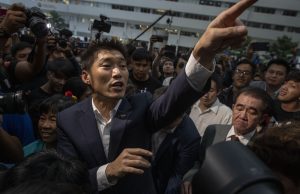When the Thai Constitutional Court voted in favor of stripping Thanathorn Juangroongruangkit’s legal status as a Member of Parliament (MP) on November 20, 2019, hashtags demonstrating solidarity behind the firebrand billionaire-turned-politician became Thailand top Twitter trend. The high court ruled that he violated Section 98 of the constitution, which prohibits proprietors or shareholders of media companies from running for office out of concern that they would leverage their outlets to attack political rivals. According to the judges’ readout, Thanathorn, who owned shares in his family’s V-Luck Media Company, failed to deliver compelling evidence to prove that there was a change in shareholders before he launched his bid in February for the 2019 March general election.
Many younger Thais, who have grown tired of the country’s vicious cycle of coups, lauded Thanathorn and his Future Forward Party as a beacon of hope for Thailand’s struggle against the military’s tight grip on politics. To the generals and the conservative elites, his progressive values and unapologetic denunciations of the ruling government were perceived as attempts to overturn the traditional pillars of the Thai state.
His removal from public office marks the latest milestone in the country’s backward slide into authoritarianism. Worse, it foreshadows a more sinister item in the regime’s menu of manipulation: maneuvering behind a façade of checks and balances to keep the opposition at bay.
Despite high hopes among Thai progressives, Thanathorn’s downfall is perhaps unsurprising to some. In the run-up to the election, the junta had already meticulously laid down traps that would slowly bleed out the democratic opposition in the post-election period such as instituting an electoral system and laws that favored pro-military parties.
The mechanics of manipulation began their post-election onslaught against Thanathorn after his party, a newcomer to the Thai political scene, surged to the national spotlight with the third highest number of seats in the election. Not too long after, dreams started to morph into nightmares for Thai progressives. A conservative activist petitioned the Election Commission (EC) to look into Thanathorn’s media shares. His complaint was accepted and the commission went to work, rolling out evidence suggesting that Thanathorn still had 675,000 shares in V-Luck at the time he submitted his candidacy, which made him ineligible to run in the first place. At one point in the process, the chairman of the EC’s subcommittee tasked with the investigation resigned due to alleged pressure to rule against Thanathorn. As he disputed the EC’s version of events by arguing that the share transfer was made on January 8, his political enemies doubled down on the offensive. Conservative activists petitioned for additional investigations into donations and loans he made to his party.
In the short-term, the junta’s strategy of delegating its repressive tasks to civilian institutions in the post-election period has paid off: a charismatic challenger was removed in a lengthy legal process that maintained the semblance of liberal-democratic traditions without inciting mass protests. A day before the ruling, this proclivity was highlighted in Prime Minister General Prayuth Chan-o-Cha’s statement when he told reporters that he was not the plaintiff and emphasized that Thanathorn’s case lay solely within the judicial domain.
One could suggest that Thanathorn has only himself to blame for some of the inconsistencies of the evidence he presented. For instance, the court noted that none of the testimonial documents issued by V-Luck were official documents recorded by the Commerce Ministry’s Department of Business Development to prove that transactions took place on January 8.
But the final blow that closed the chapter on Thanathorn’s political career seems to be the beginning of an impending effort to break the momentum of the opposition. The EC is already pursuing criminal charges against Thanathorn’s decision to run for office. If found guilty, he could face imprisonment, fines, and a ban from politics for 20 years.
These unfolding dilemmas do not bode well for Future Forward, especially in light of reports of growing disagreements within the party. One representative broke party line twice during parliamentary voting sessions and party members that were former constituent candidates who failed to win a seat in their districts are now turning their backs on party leaders, accusing them of nepotism and favoritism. The reasons behind their rebellions are murky. Some have advanced claims that bribery was involved while others argue that there is unequal treatment within the party in which list MPs with a large public following enjoy more privileges and prerogatives than constituent MPs who do not have the same level of star status.
As Thanathorn begins his transition into a more activist role in mobilizing the public to support the main efforts on the legislative battlefield, perhaps it is time for Future Forward to gradually shed its image as the “Party of Thanathorn” to a “Party of Ideas.” Parties built solely on a charismatic individual rarely survive the test of time, let alone the continuous bloodletting effort by the regime. Going up against a colossal military machine, Future Forward needs to win the war of ideas. The task ahead is not to catapult more progressive stars to the center stage, but rather to cultivate subject matter expertise among all ranks within the party and, at the same time, advance a narrative of hope that inspires ordinary Thais to reclaim their voice after five years of living under military rule.
Chonlawit Sirikupt is an MA candidate at the Eberhard Karls University of Tübingen in Germany.

































